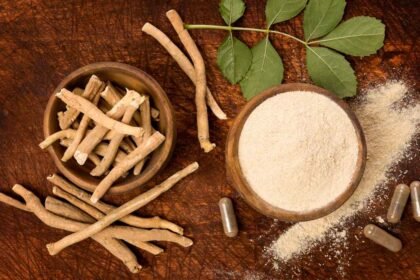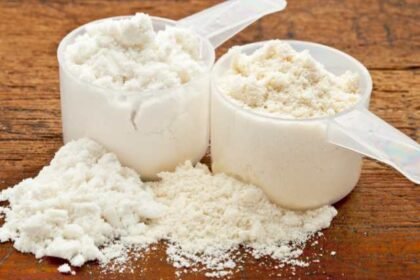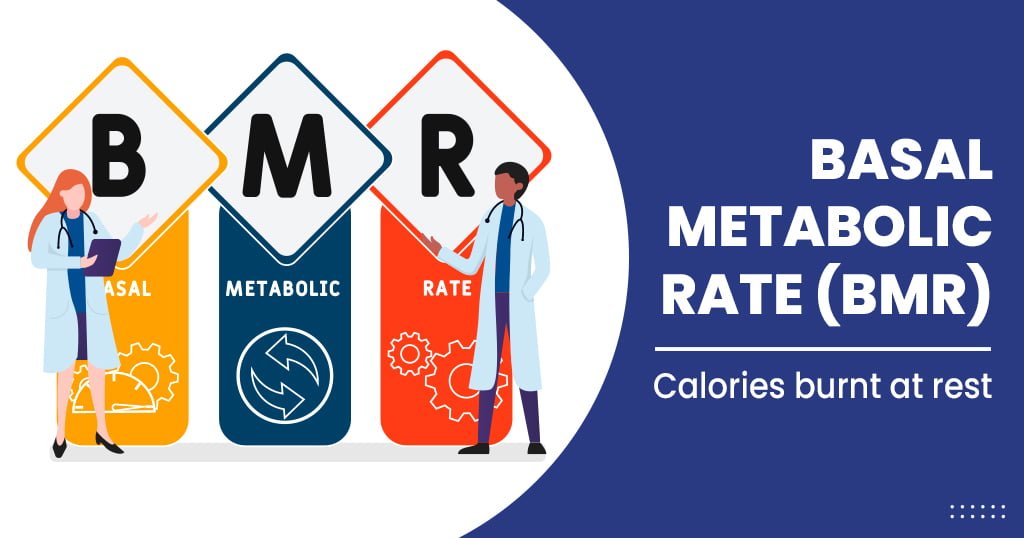In recent years, the practice of intermittent fasting has gained popularity as a means of enhancing health and fitness and facilitating weight loss. There are a variety of approaches to intermittent fasting, but whichever method you choose, it’s important to make sure you’re getting plenty of quality, nourishing food throughout your eating windows.
In this post, we’ll take a look at the 9 best foods to eat during intermittent fasting, based on the evidence of their health advantages and the findings of scientific studies. Intermittent fasting is gaining popularity, with 10% of Americans reporting trying it in 2021 according to a survey by the International Food Information Council.
1. Nuts and Seeds

A. Why Does Intermittent Fasting Works Best with Nuts and Seeds?
Because of their high nutrient density, including many vitamins, minerals, healthy fats, protein, and fiber, nuts, and seeds are great for intermittent fasting. If you’re having trouble sticking to your fasting schedule due to feelings of hunger or deprivation, these nutrients may assist.
B. Some of the Best Options
If you’re following an intermittent fasting diet, here are some of the best nut and seed options to incorporate into your meals:
- Almonds
- Walnuts
- Chia seeds
- Flaxseeds
- Pumpkin seeds
- Sunflower seeds
- Cashews
- Pistachios
- Brazil nuts
- Hazelnuts
C. Benefits of Intermittent Fasting with Nuts and Seeds
- Healthy fats: Healthy fats, such as monounsaturated and polyunsaturated fatty acids, can be found in abundance in nuts and seeds. The anti-inflammatory, cardioprotective, and cognitive benefits of these fats are undeniable.
- Fiber: The high fiber content of nuts and seeds has been linked to a variety of health benefits, including aid in digestion, lowered blood sugar, and enhanced satiety.
- Protein: Plant-based proteins, including those found in nuts and seeds, can aid in muscle development and repair.
- Vitamins and minerals: Vitamin E, magnesium, and zinc, among others, are abundant in nuts and seeds and can contribute to general health and well-being.
2. Lean Proteins
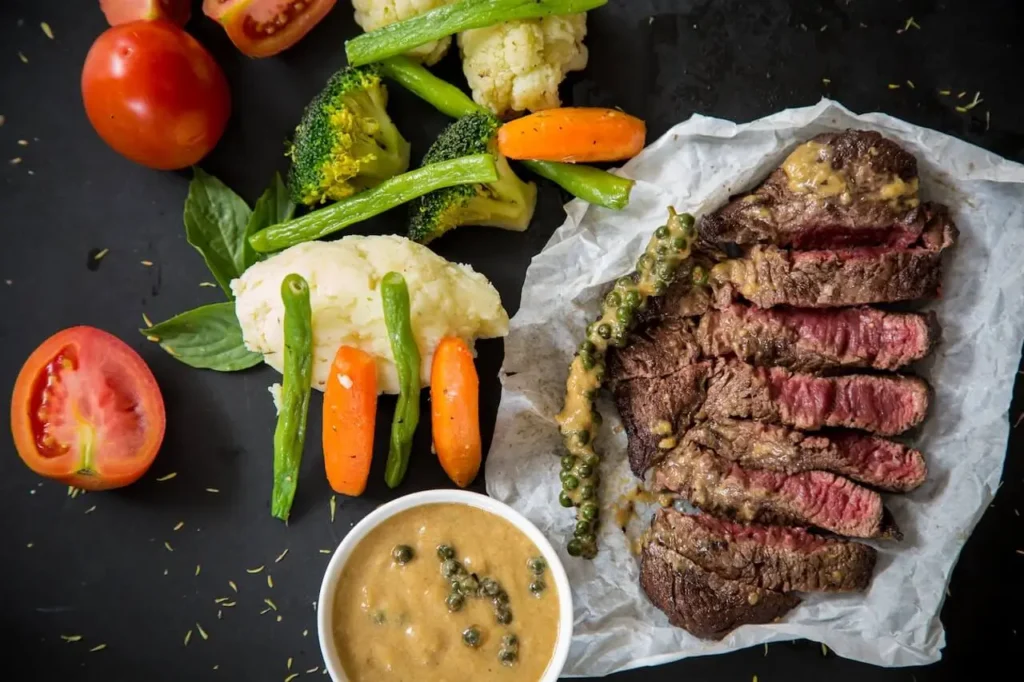
A. Protein’s Relevance During Intermittent Fasting
There are many reasons why it’s crucial to consume enough protein while intermittent fasting. Protein is required for the development and maintenance of all bodily tissues. In addition, it aids in maintaining stable blood sugar levels, which can forestall fatigue and hunger pangs.
Lean muscle mass, which is susceptible to breakdown during prolonged fasting, can be protected by consuming sufficient protein during intermittent fasting.
B. Some of the Best Lean Protein Sources
Several great options for lean protein during intermittent fasting are listed below.
- Chicken breast
- Turkey breast
- Fish (such as salmon, tuna, or cod)
- Tofu
- Lentils
- Quinoa
- Greek yogurt
- Cottage cheese
- Eggs
C. How Protein Keeps You Full During Fasting
There are several ways in which protein might help you feel full and satisfied when fasting. To begin, protein is digested more slowly than either carbohydrates or fats, so it stays in your stomach longer and aids in keeping you full.
The hormones leptin and peptide YY, both of which are released in response to satiety cues from the brain, are both triggered by protein consumption. This may help with hunger reduction and overeating prevention of intermittent fasting meal windows.
3. Leafy Greens
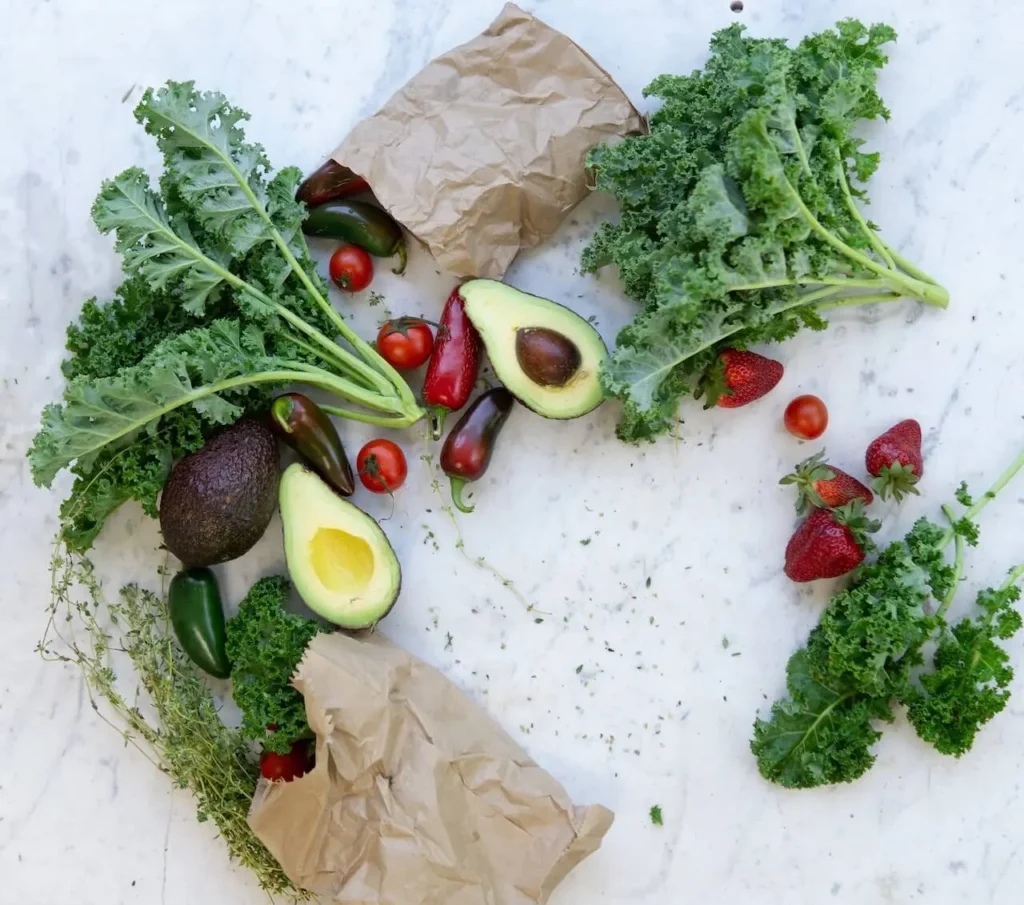
A. The Nutritional Benefits of Leafy Greens
Spinach, kale, and arugula are just a few examples of leafy greens that are brimming with beneficial elements. Antioxidants and vitamins like A and C as well as minerals like iron and calcium can be found in abundance in these foods.
Healthy vision, strong bones, and a robust immune system are all supported by these nutrients, and there is some evidence that they may also lessen the risk of chronic diseases like heart disease and cancer.
B. Why These Foods are Great for Intermittent Fasting
Because they are low in calories but abundant in nutrients, leafy greens are excellent for intermittent fasting. This is because you can consume a lot of them without taking in an excessive amount of calories due to their nutrient density.
During periods of fasting, when you want to maximize the nutritional value of your meals while keeping your calorie intake as low as possible, this can be helpful.
C. Including More Leafy Greens in Your Diet
Some ways to increase your intake of greens are listed below.
- Toss some kale or spinach into your morning drink.
- Make your salad with a bed of arugula or mixed greens.
- Add some sautéed spinach or kale to your breakfast eggs.
- Soups and stews benefit from the addition of chopped kale or collard greens.
- After baking, sprinkle your pizza with an arugula or a mixture of greens.
- Wrap your sandwich on a lettuce leaf instead of using bread.
4. Fatty Fish

A. Why Salmon and Sardines are Perfect for Intermittent Fasting
Salmon and sardines, both of which are fatty fish, are excellent choices for intermittent fasting since they provide both protein and healthful fats. In addition to their health benefits, these nutrients can help you feel full and content throughout your fast.
B. Health Benefits of Omega-3 Fatty Acids Found in Fish
Omega-3 fatty acids, which are abundant in fish, have been linked to several health advantages. Omega-3s are important fats that the body can’t make on its own and must get from food.
Inflammation is lowered, heart health is enhanced, brain function is supported, and the risk of chronic diseases including diabetes, cancer, and Alzheimer’s is lowered when these fats are consumed.
C. Tips for Cooking and Serving Fish
Here are some tips for cooking and serving fish:
- Choose fish that has a pleasant aroma and firm flesh.
- You can bake, broil, or grill fish. If you’re trying to eat healthily, you should probably skip the fried fish.
- Fish can be enhanced with the addition of herbs, spices, or citrus juice.
- For a healthy lunch, pair fish with a side of greens or roasted veggies.
- Canned fish like sardines and salmon can be a quick and inexpensive meal. You should prefer canned fish that has been packed in water or olive oil.
5. Berries

A. Benefits of Eating Berries During Intermittent Fasting
The strong antioxidant content of berries makes them an ideal food to eat during intermittent fasting. Free radicals are unstable chemicals that can contribute to chronic diseases like cancer, heart disease, and Alzheimer’s, and antioxidants help to protect the body from this damage. Berries are a fantastic choice for relieving hunger pangs during fasting because they are high in fiber and low in calories.
B. Best Options for Berries
- Strawberries
- Blueberries
- Raspberries
- Blackberries
- Cranberries
C. Suggestions for Incorporating Berries Into Your Diet
Some ideas on how to increase your intake of berries:
- Include some berries in your morning yogurt or cereal.
- Make a healthy and delicious smoothie with your favorite fruit.
- Top your pancakes or waffles with some berries.
- Add some berries to your salad for a colorful and tasty twist.
- Fresh or frozen, berries are a delicious and nutritious dessert option.
6. Avocado

A. Benefits of Eating Avocado During Intermittent Fasting
The nutrient-rich avocado is a wonderful complement to a fasting diet. A good source of both monounsaturated and polyunsaturated fats, it can help you feel full and satisfied throughout your fast. Fiber helps digestion and makes you feel full, and avocado is a rich source of both.
B. Tips for Including Avocado in Your Meals
Some suggestions for using avocado in your cooking:
- Toss some sliced avocado into your salad for some extra taste and heart-healthy lipids.
- For a filling and healthy breakfast or snack, try spreading mashed avocado on whole-grain toast.
- Use avocado for mayonnaise or sour cream when making dips or dressings for a healthier option.
- Diced avocado is a healthy and filling addition to breakfast omelets or scrambled eggs.
- Make a nutritious and luscious smoothie out of avocado.
7. Bone Broth

A. Why Bone Broth is an Ideal Food for Intermittent Fasting
The low-calorie count and satiating effects of bone broth make it a great food choice for intermittent fasting. Moreover, it contains beneficial minerals including calcium, magnesium, and potassium in addition to protein.
B. Health Benefits of Bone Broth
The collagen in bone broth is just one of the reasons it is considered healthy. Animals’ bones, skin, and other connective tissues contain collagen, a kind of protein.
Bone broth, which is high in collagen, may benefit the health of the skin, the joints, and the intestines. In addition to bolstering the immune system and lowering inflammation, bone broth may also improve the health of your hair and nails.
C. Tips for Making and Consuming Bone Broth
Some suggestions on how to prepare and enjoy bone broth:
- For the most flavor and nutrition, use grass-fed beef bones or free-range chicken bones.
- Vegetables like onions, carrots, and celery can be added to the broth to boost its nutritional value and enhance its flavor.
- To get the most nutrients from the bones, simmer the broth for at least 24 hours.
- Before drinking, strain the broth to get rid of the solids.
- Soups, stews, and other dishes can all benefit from using broth as a base.
8. Fermented Foods

A. Benefits of Eating Fermented Foods During Intermittent Fasting
Improved gut health is only one of several potential advantages of eating fermented foods between meals when intermittent fasting. Probiotics, which are found in fermented foods, are helpful bacteria that dwell in the gut and aid with digestion, immune system function, and inflammation reduction. They aid weight loss by controlling hunger pangs.
B. Some of the Best Options
Here are some of the best options for fermented foods:
- Yogurt: Yogurt is a delightful and healthy addition to an intermittent fasting diet since it is a rich source of probiotics and protein. If you want the health advantages without the added sugar, go for plain yogurt.
- Kimchi: Kimchi, a popular Korean side dish, is produced from fermented cabbage and is high in beneficial bacteria and beneficial vitamins. Its spicy, tangy taste complements many other foods.
- Sauerkraut: The fermented cabbage used to make sauerkraut is a great source of healthy bacteria and powerful antioxidants. It’s a versatile condiment that goes well on sandwiches, salads, and as a side dish.
C. Suggestions for Incorporating Fermented Foods into Your Diet
Some ideas for fermented food consumption are provided below.
- You may increase the probiotic value of smoothies and oatmeal by adding a dollop of yogurt to each.
- You can eat kimchi as a side dish or incorporate it into other dishes like stir-fries and noodles.
- Sandwiches, hot dogs, and salads all benefit from sauerkraut’s crisp texture and acidic flavor.
9. Water

A. Importance of Staying Hydrated During Intermittent Fasting
Because water regulates body temperature, flushes out waste and toxins, and keeps joints lubricated, maintaining an adequate water intake is critical during intermittent fasting. In addition to reducing hunger and facilitating weight reduction, drinking plenty of water during fasting periods helps to keep you feeling full and pleased.
B. Tips for Drinking Enough Water
If you want to make sure you stay hydrated when intermittent fasting, consider these suggestions:
- Make sure you always have ready access to water by keeping a bottle of water with you at all times.
- Make sure to stay hydrated by setting regular reminders on your computer or phone.
- If you want to avoid feeling hungry in between meals, try drinking a glass of water first.
- Infuse your water with fresh fruit or herbs to give it a unique flavor.
- To prevent dehydration and hunger pangs during fasting, try drinking black coffee or herbal tea.
Frequently Ask Questions
What is intermittent fasting, and how does it work?
Fasting for extended periods and then eating normally again is known as intermittent fasting. The 16:8 strategy is abstaining from food for 16 hours before eating during an 8-hour window; the 5:2 approach has you eating regularly for 5 days and then cutting back on calories for 2 days. By reducing food consumption and increasing fat burning, intermittent fasting can help people lose weight and improve their health indicators.
Why are nuts and seeds ideal for intermittent fasting?
High in healthy fats, fiber, and protein, nuts, and seeds are great for intermittent fasting because they help you feel full and content for longer. Because of their minimal caloric content, they provide a satisfying snack that won’t derail your diet plan.
What are some of the best lean protein sources for intermittent fasting?
Chicken, turkey, salmon, and tofu are some of the greatest lean protein sources that can be eaten during intermittent fasting. These meals are high in protein and low in calories, making them a good choice for fasting diets.
Why are leafy greens great for intermittent fasting?
Because of their low-calorie count and high content of fiber, vitamins, and minerals, leafy greens are an excellent food choice for intermittent fasting. In addition to supplying necessary nutrients for health and well-being, they can aid in promoting satiety and supporting weight loss efforts.
How can I ensure that I am getting enough nutrients during intermittent fasting?
Nutrient-dense foods like lean proteins, fruits, vegetables, healthy fats, and whole grains are essential for intermittent fasting. Take a multivitamin or work with a qualified dietitian to create a nutritionally balanced dietary plan.





